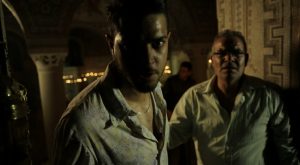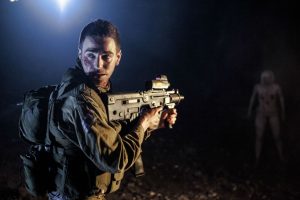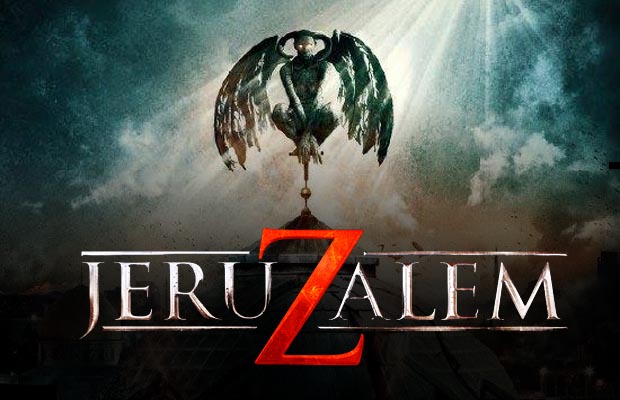Zombie Reviews . . . JeruZalem
Summary
Technology often impacts the way filmmakers approach their next big project. In this case, newly available technology gave the filmmakers a way to “shoot” everything through the main character’s eyes using Google’s Glass. Do the adaptations to typical cinematography style make the footage as nauseating as Blair Witch? Not really. The bouncing around isn’t as erratic as home camera footage films and comes across as more natural movement which doesn’t jerk viewer’s attention around so much, they get motion sickness. The downside to using new technology as the backbone in the film shows in the creature development and the final string of fight scenes. A lot of the digital work went into animating Glass effects, not so much on the fully transformed undead. No idea is perfect. And as much as I’d love to buck against something as gimmicky as using Glass to film 98% of the footage, it works for the plot and for the acting talents of those involved. A bigger production would’ve buried some of these performances, or highlighted how one main actress was best used for her voice alone because on-camera, her performance becomes stilted and uncomfortable to witness.
Zombie Reviews . . . JeruZalem
By A. Zombie
Rated: R (Adult Language, Violence, Drug Use, Nudity)
Starring: Yael Grobglas, Yon Tumarkin, Danielle Jadelyn, and Tom Graziani
 Camera gimmicks aside, this is perhaps one of the most unique zombie origin stories I’ve seen in years. It’s not just a random, evolved disease. There’s no shadow government running tests on humanity. Asteroids have nothing to do with spreading a weird virus. For JeruZalem they went back to the religious origins behind mankind’s obsession with the dead rising. Every Rosh Hashanah mankind is judged. This time around, the living fail the test and the dead rise in Jerusalem to punish them.
Camera gimmicks aside, this is perhaps one of the most unique zombie origin stories I’ve seen in years. It’s not just a random, evolved disease. There’s no shadow government running tests on humanity. Asteroids have nothing to do with spreading a weird virus. For JeruZalem they went back to the religious origins behind mankind’s obsession with the dead rising. Every Rosh Hashanah mankind is judged. This time around, the living fail the test and the dead rise in Jerusalem to punish them.
 Tourists Sarah and Rachel are side-tracked from their vacation in Tel Aviv by a handsome anthropologist, Kevin, who suggests they go with him to Jerusalem instead to celebrate the New Year. The trio pack into a hostel run by the charming Omar and his family. Desperate to party, the ladies take Kevin and Omar out to check out the nightlife. We get a taste of the everyday conflicts between the numerous cultures jammed into the city during their escapades. They spend some time flirting with two soldiers, Omar isn’t as welcoming. For the most part, the party scenes are just that, save the splashes of stark reminders that the people living in Jerusalem do so in constant tension with one-another. It’s not until the final day of the celebration when things get weird. Violent news reports dominate the airwaves, which Omar brushed off until it was too late to take action, and too widespread to continue softening the horror for the hostel’s guests. Because they’re so slow to see the undead threat, they’re trapped in the city when it’s put under quarantine. The only way out is through a massive tunnel system; one older gentleman knows the path.
Tourists Sarah and Rachel are side-tracked from their vacation in Tel Aviv by a handsome anthropologist, Kevin, who suggests they go with him to Jerusalem instead to celebrate the New Year. The trio pack into a hostel run by the charming Omar and his family. Desperate to party, the ladies take Kevin and Omar out to check out the nightlife. We get a taste of the everyday conflicts between the numerous cultures jammed into the city during their escapades. They spend some time flirting with two soldiers, Omar isn’t as welcoming. For the most part, the party scenes are just that, save the splashes of stark reminders that the people living in Jerusalem do so in constant tension with one-another. It’s not until the final day of the celebration when things get weird. Violent news reports dominate the airwaves, which Omar brushed off until it was too late to take action, and too widespread to continue softening the horror for the hostel’s guests. Because they’re so slow to see the undead threat, they’re trapped in the city when it’s put under quarantine. The only way out is through a massive tunnel system; one older gentleman knows the path.
By then, they’ve had a few face-to-face encounters with the undead. These zombies are a hybrid, bringing in more demon than zombie aesthetic to the creature design. They’re rotted humans, but the final evolution includes functional wings, black eyes, and claws. Because this was shot to look like Glass footage, everything in the dark is super grainy, no matter what resolution screen you watch it on. What could’ve been a super neat zombie design is muddied in the shadows. Fight scenes where the undead are close enough to see detail are choppy. Almost all of the latter fights include several minutes where the point-of-view is seriously compromised, there’s no light, or the camera is sideways on the floor. The zombie/demons aren’t the only creature. We get one head-scratching shot of something the locals call a Nephilim. It’s massive, towering over the buildings as it strolls by. Then we kinda forget there’s a huge thing walking through the Old City and continue on.
 There’s little to get to know about the characters. They wear it all on their sleeves. Sarah is emotionally scarred from her brother’s death. Rachel is tired of her buzzkill bestie and wants to party. Kevin has a niggling idea about the undead rising, but by the time he thinks past getting in Sarah’s pants, he can’t save anyone. Omar has the most depth of them all, completely stealing the show from the ladies at every turn. This is the kind of film where it’s easy to forget to spend time developing the characters because the writers are so focused on how they’d die. And die they do. We see first-hand how a living soul turns into one of the undead. Which is really ridiculous because it means the main characters knowingly tote an infected person along for the great cave escape. Spoilers: Like any good zombie movie, there’s not much hope for mankind. The ending isn’t that shocking, but does leave fans with a nice sense of dread with the closing shot of a zombie/demon swarm over Jerusalem.
There’s little to get to know about the characters. They wear it all on their sleeves. Sarah is emotionally scarred from her brother’s death. Rachel is tired of her buzzkill bestie and wants to party. Kevin has a niggling idea about the undead rising, but by the time he thinks past getting in Sarah’s pants, he can’t save anyone. Omar has the most depth of them all, completely stealing the show from the ladies at every turn. This is the kind of film where it’s easy to forget to spend time developing the characters because the writers are so focused on how they’d die. And die they do. We see first-hand how a living soul turns into one of the undead. Which is really ridiculous because it means the main characters knowingly tote an infected person along for the great cave escape. Spoilers: Like any good zombie movie, there’s not much hope for mankind. The ending isn’t that shocking, but does leave fans with a nice sense of dread with the closing shot of a zombie/demon swarm over Jerusalem.
JeruZalem has its faults, it really does. However, I cannot tell you how refreshing it is to watch a zombie-centric film which isn’t set in America, the UK, or Germany. The change in location and culture dictated a change in the story-telling process. Doing something different is a terrifying challenge, one genre filmmakers relish and fans lap up like warm milk—watching the same set of characters doing the same things and running from the same monsters over and over is a drag. This film is not the next NotLD, but I’m giving JeruZalem three-point-five mangled mandibles out of five. I’d add it to a marathon night of found-footage films.

